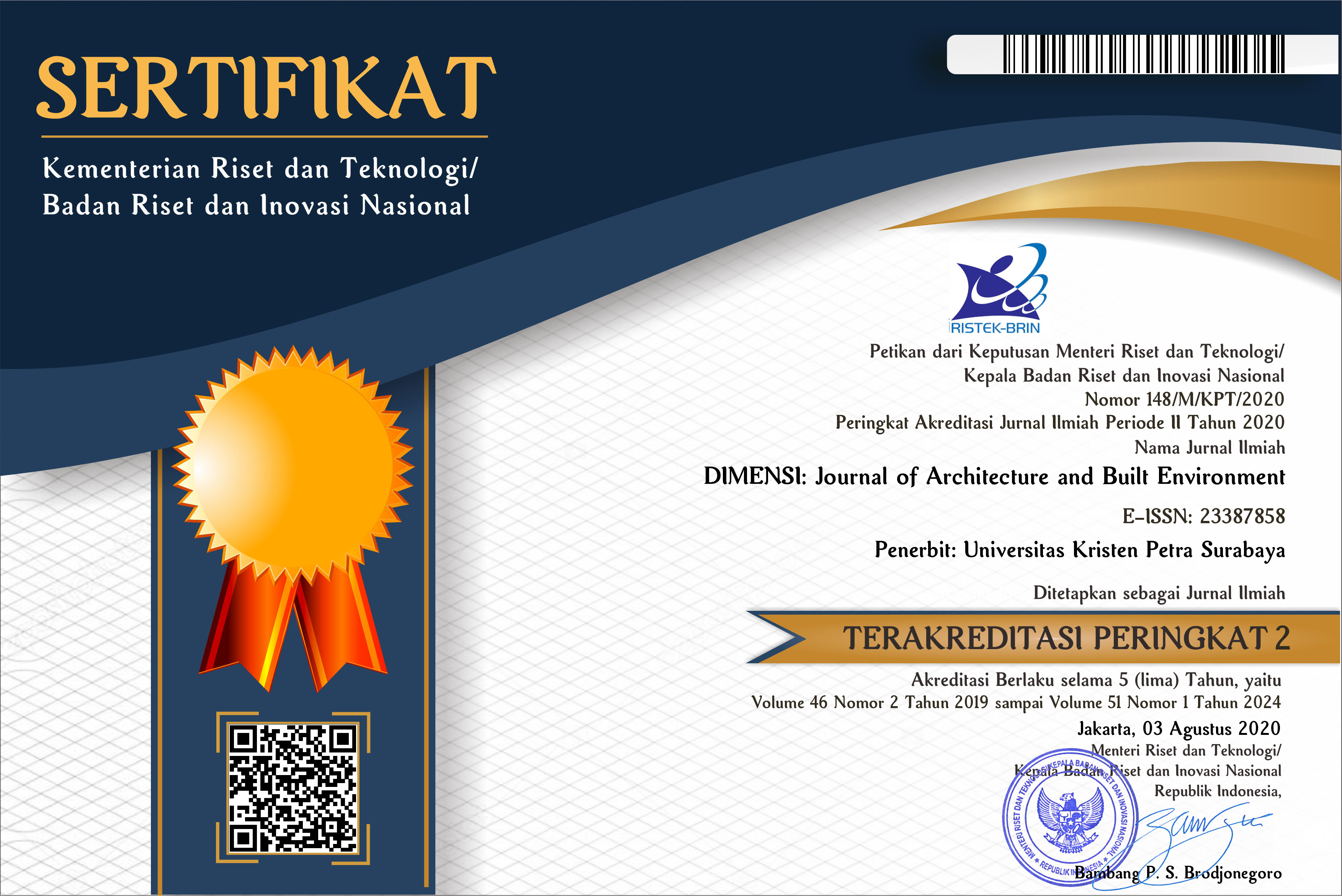SETTLEMENT OPEN SPACE DEVELOPMENT BY APPROACH WSUD METHOD IN MANADO CITY
 :
:
https://doi.org/10.9744/dimensi.44.2.117-128
Keywords:
Urban settlement, open space, WSUD, climate change, Manado City.Abstract
Nowadays, the quality of green open space in urban settlements is gradually decreasing because of land use changes as well as new building construction. Moreover, urban community is often facing risk of river flooding and rainwater puddles during the rainy season. The purpose of this research is developing an urban open space network with function to managing rain water in settlement areas in Manado city. The WSUD planning principles is analysis as research variable and open space areas are defined into four type’s namely public zone, semipublic zone, semi private zone and private zone. This open space zones is considering into two main aspect, first the user of space (private or public) and next the decision maker (individual, groups, local government). The planning concept for urban settlement areas sensitive to water can be achieved by approaching three development types: open space network, buildings layout and streetscape.
Downloads
References
Erwin, H. (2012). Green Space Analysis Based On Oxygen Demands Using the EO-1 ALI (Earth Observer1 Advanced Land Imager) in Manado City. Info BPK Manado, 2(1), pp. 41-54. [CrossRef]
Lensun, M. & Sipriana, T. (2013). Water pollution level of Tondano River at Ternate Baru Village, Manado. Jurnal Budidaya Perairan, 1(2), pp. 43-48. [CrossRef]
Lokita, A. D. (2011). Adaptasi Konsep Water Sensitive Urban Design (WSUD) di Kawasan Cagar Budaya Kota Lama Semarang. Jurnal Peren-canaan Wilayah dan Kota, 22(1), pp. 65-80. [CrossRef]
Moniaga, I. M. & Esli, D. T. (2015). Pengembangan RTH Kota Berbasis Infrastruktur Hijau dan Tata Ruang (Studi Kasus: Kota Manado). Prosiding Temu Ilmiah IPLBI. pp. A027-A032 [CrossRef]
Putra, R. L. (2016). Evaluasi Penggunaan Lahan Sempadan Sungai Sario di Kota Manado. Skripsi Program Studi Perencanaan Wilayah dan Kota, Fakultas Teknik Universitas Sam Ratulangi. [CrossRef]
Sompie, B. F. & Robert, J. M. (2012). Optimasi Penanggulangan Bencana Banjir Di Kota Manado Dengan Metode AHP (analytical hierarchy process). Journal Ilmiah MEDIA ENGINEERING, 2(4), pp. 232-237. [CrossRef]
Tarima, G. C. et al. (2016). Analisis kualitas air Sungai Sario Kecamatan Sario Manado Sulawesi Utara. Journal Ilmiah Sains, 16(1), pp. 19-23. [CrossRef]
Taringan, A. et al. (2013). Quality of Study of Domestic Wastewater in Rivers Passing Through Manado City Based on Organic and Inorganic Materials. Journal Pesisir dan Laut Tropis, 1(1), pp. 55-62. [CrossRef]
Stormwater Committee. (2006). Urban Stormwater: Best Practice Environmental Management Guidelines. [CrossRef]
Warouw, F. et al. (2016). Pendekatan Konsep Water Sensitive Urban Design dalam Penataan Ruang Permukiman di Kota Manado. Laporan Tahun-an Penelitian Unggulan Perguruan Tinggi. Universitas Sam Ratulangi. [CrossRef]
Kementrian PU. Buku Panduan Program Pengem-bangan Kota Hijau (P2KH): Panduan Pelak-sanaan 2011. [CrossRef]
Per Men PU No. 5 Tahun 2008 tentang Pedoman Penyediaan dan Pemanfaatan Ruang Terbuka Hijau di Kawasan Perkotaan. [CrossRef]
Per Men PU No. 12 Tahun 2009 tentang Pedoman Penyediaan dan Pemanfaatan Ruang Terbuka Non Hijau di Wilayah Kota/Kawasan Perkotaan. [CrossRef]
Per Men PU No. 12 Tahun 2014 tentang Sistem Drainase Perkotaan. [CrossRef]
UU No. 26 Tahun 2007 tentang Penataan Ruang. [CrossRef]
UU No. 1 Tahun 2011 tentang Perumahan dan Kawasan Permukiman. [CrossRef]
PP No. 38 Tahun 2011 tentang Sungai. [CrossRef]
PP No.37 Tahun 2012 tentang Pengelolaan DAS. [CrossRef]
UU No.7 Tahun2004 tentang Sumber Daya Air. [CrossRef]
Downloads
Published
How to Cite
Issue
Section
License
Authors who publish with this journal agree to the following terms:
- Authors retain copyright and grant the journal right of first publication with the work simultaneously licensed under a Creative Commons Attribution License that allows others to share the work with an acknowledgement of the work's authorship and initial publication in this journal.
- Authors are able to enter into separate, additional contractual arrangements for the non-exclusive distribution of the journal's published version of the work (e.g., post it to an institutional repository or publish it in a book), with an acknowledgement of its initial publication in this journal.
- Authors are permitted and encouraged to post their work online (e.g., in institutional repositories or on their website) prior to and during the submission process, as it can lead to productive exchanges, as well as earlier and greater citation of published work (See The Effect of Open Access).


















